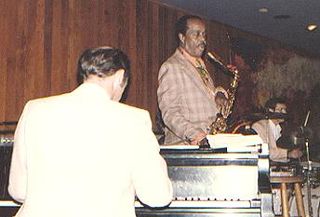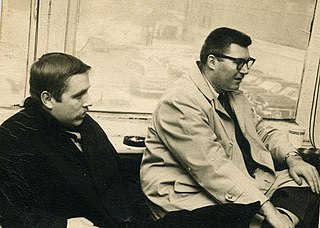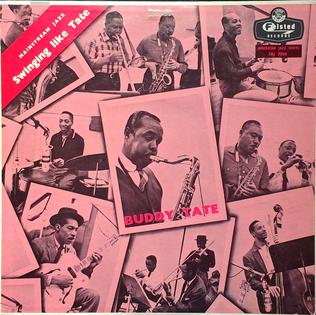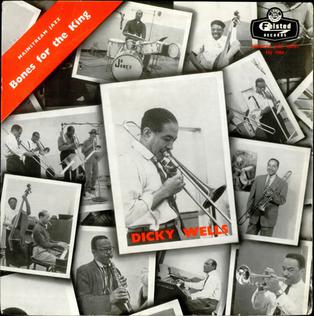Related Research Articles
Claude Driskett Hopkins was an American jazz stride pianist and bandleader.

Wilbur Dorsey "Buck" Clayton was an American jazz trumpet player who was a leading member of Count Basie's "Old Testament" orchestra and a leader of mainstream-oriented jam session recordings in the 1950s. His principal influence was Louis Armstrong, first hearing the record "Confessin That I Love You" on Central Avenue as he passed by a shop window.The Penguin Guide to Jazz says that he “synthesi[zed] much of the history of jazz trumpet up to his own time, with a bright brassy tone and an apparently limitless facility for melodic improvisation”. Clayton worked closely with Li Jinhui, father of Chinese popular music in Shanghai. His contributions helped change musical history in China, Hong Kong and Taiwan.

Jonathan David Samuel Jones was an American jazz drummer. A band leader and pioneer in jazz percussion, Jones anchored the Count Basie Orchestra rhythm section from 1934 to 1948. He was sometimes known as Papa Jo Jones to distinguish him from younger drummer Philly Joe Jones.

Felsted Records was the name of two record labels. The UK version began as a subsidiary of Decca Records in July 1954 with music mainly in the jazz and dance band genres and recordings leased from the French Blue Star, Riviera, and Classique labels. The label took its name from the village where Sir Edward Lewis, the head of UK Decca, lived. The British label's only release of note was "Smokie", the first single by Bill Black's Combo, Black having been Elvis Presley's bassist, licensed from Hi Records.

William Wells, known professionally as Dicky Wells, was an American jazz trombonist.
Victor Dickenson was an American jazz trombonist. His career began in the 1920s and continued through musical partnerships with Count Basie (1940–41), Sidney Bechet (1941), and Earl Hines.

George Holmes "Buddy" Tate was a jazz saxophonist and clarinetist.
Emmett Berry was a jazz trumpeter.
James "Osie" Johnson was a jazz drummer, arranger and singer.

Benny Morton was a jazz trombonist most associated with the swing genre.

Nathaniel Pierce Blish Jr., known professionally as Nat Pierce was an American jazz pianist and prolific composer and arranger, perhaps best known for being pianist and arranger for the Woody Herman band from 1951 to 1955. Pieces by Pierce were predominantly created for use in big bands.
Joseph Rupert Benjamin was an American jazz bassist.
Everett Barksdale was an American jazz guitarist and session musician.
Herbie Lovelle was an American drummer, who played jazz, R&B, rock, and folk. He was also a studio musician and an actor.
George Matthews was a jazz trombonist.
Sydney Francis "Pat" Jenkins was an American jazz trumpeter, best known for his associations with Al Cooper and Buddy Tate.
ChaunceyLeon Westbrook, known professionally as Chauncey "Lord" Westbrook, was an American jazz guitarist.
Elmer H. "Rudy" Rutherford was an American jazz saxophonist and clarinetist.

Swinging Like Tate is an album by saxophonist Buddy Tate which was recorded in 1958 and released on the Felsted label.

Bones for the King is an album by trombonist Dicky Wells which was recorded in 1958 and released on the Felsted label.
References
- Barry Kernfeld, "Skip Hall". The New Grove Dictionary of Jazz . 2nd edition, 2004.